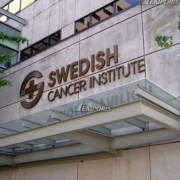New Study Shows a Decline in the Incidence of Recurrent Metastatic Breast Cancer Over Time but no Improvement in Survival
NEW YORK, Feb. 1, 2019 /PRNewswire/ — A retrospective analysis – reported in the journal Breast Cancer Research and Treatment, by Judith Malmgren, PhD, and co-authors – studied 8292 women with stage I-III invasive breast cancer, 964 of whom (11.6%) were later diagnosed with recurrent metastatic breast cancer (rMBC). The authors found a significant decline in rMBC over time, but no increase in survival. Survival after an rMBC diagnosis decreased over time, from 23% in the years between 1990 and 1998, to 21% between 1999 and 2004, and to 13% between 2005 and 2011. Judith Malmgren, PhD, the study’s lead author stated, “Although this is encouraging and points to the success of current treatment modalities for invasive breast cancer, the absence of survival improvement after a distant recurrence is concerning.”
An earlier MBC Alliance study, in partnership with the National Cancer Institute, estimated that about 155,000 people in the United States are living with MBC. Next, these authors studied two types of MBC, de novo MBC and distant recurrence after an invasive breast cancer diagnosis, and found better survival following a de novo MBC diagnosis. Findings in the current and previous study show that rMBC patients do worse, both over time and compared to patients with de novo MBC. Dr. Malmgren, the lead author of both studies, noted that the findings in the current study “reinforce the difference in survival post diagnosis for de novo stage IV breast cancer compared to a distant recurrence after an invasive breast cancer diagnosis.”
Another goal of the current study was to explore receptor subtypes in detail. The incidence of HER2+ and hormone receptor (HR)+ rMBC both decreased, but the incidence of triple negative (HER2− and HR−) rMBC did not, creating a relative increase in triple negative rMBC overall. Dr. Malmgren commented that “this points to the lack of successful treatment for initial triple negative breast cancer and creates a real clinical treatment challenge.” Study author Henry Kaplan, MD, stated that “although triple negative breast cancer has continued to be a very big problem, there are multiple new treatments being evaluated for this disease, both in BRCA mutated and BRCA wild-type patients, including new chemotherapy drugs, immunotherapies, and drugs to reverse the effects of genetic mutations that predispose a patient to triple negative disease.”
New and better treatments over the last few decades, including Herceptin® (trastuzumab) for HER2+ breast cancer and hormone therapy for HR+ breast cancer, likely led to the decrease in recurrence of these subtypes. Hence, the current rMBC population is more likely to be triple negative, and/or to be more heavily pretreated regardless of subtype. These characteristics make treatment for rMBC more difficult and may have contributed to the observed worse survival over time.
“The current study led by Dr. Malmgren builds on the body of research led by the MBC Alliance to answer key questions about the epidemiology of metastatic breast cancer,” noted Shirley Mertz, Chair of the MBC Alliance. “In our 2014 MBC Landscape Analysis, we identified a paucity of information about the epidemiology of MBC. The Alliance developed key questions about MBC epidemiology related to incidence, prevalence, and outcomes, and how these changed over time. The latest study is the third in a series of research publications inspired by the MBC Alliance to answer these questions.”
As stated in the new paper, current goals for improving survival of rMBC patients include targeted therapy and better treatments for early-stage triple negative patients, improved screening and awareness, new treatment regimens for rMBC, and universal guideline-compliant care. Patients at the Swedish Cancer Institute receive NCCN guideline-compliant care. Dr. Malmgren noted that very few HR+ or HER2+ recurrences occur among these patients. She advised that, “This level of care should be available to every woman diagnosed with breast cancer.”
Study authors and affiliations:
Judith Malmgren, PhD, affiliate assistant professor of epidemiology, University of Washington School of Public Health and President of HealthStat Consulting, Inc., Seattle, WA
Marc Hurlbert, PhD, Metastatic Breast Cancer Alliance
Mary Atwood, Swedish Cancer Institute, Seattle, WA
Henry Kaplan, MD, Chief Medical Oncology Breast Cancer Service of the Swedish Cancer Institute and clinical professor of Medicine, University of Washington
The study was supported by the Kaplan Cancer Research Fund, the Metastatic Breast Cancer Alliance, and the Surveillance Epidemiology and End Results (SEER) Cancer Surveillance System (CSS) program of the National Cancer Institute.
About the Swedish Cancer Institute
The Swedish Cancer Institute (SCI) opened in 1932 as the first dedicated cancer-care center west of the Mississippi. Now in its 75th year, it is the largest and most comprehensive cancer treatment program in the Pacific Northwest. A true multidisciplinary program, SCI offers a wide range of advanced cancer-treatment options in chemotherapy, radiation therapy and surgery – backed by extensive diagnostic capabilities, patient education and support-group services. SCI’s clinical-research arm encompasses industry-sponsored and cooperative group therapeutic trials, cancer screening and prevention trials, and investigator-initiated trials. Breast cancer screening and diagnostics are available through the Swedish Breast Care Centers and mobile mammography units. For more information, visit www.swedish.org.
About the Kaplan Cancer Research Fund
The Kaplan Cancer Research Fund at Swedish was started in 1984 as a series of grants that Dr. Henry Kaplan had received while doing research related to experimental drug trials and has continued with similar funding as well as major philanthropic support. Research efforts have included work on appropriate use of mammography, outcomes of breast cancer treatments, effects of chemotherapy drugs on the development of hematologic malignancy, pharmacology of chemotherapy drugs, cancer genomics, and clinical drug trials. For more information, visit http://www.swedishfoundation.org/kaplan.
About the MBC Alliance
The Metastatic Breast Cancer Alliance (MBC Alliance) is a coalition made up of representatives from 32 nonprofit organizations and 11 pharmaceutical/biotech companies, along with 17 individual patient advocates – many of whom are living with MBC. The mission of the MBC Alliance is to improve the lives of, and outcomes for, those living with MBC and their families through increasing awareness and education about the disease and advancing policy and strategic coordination of research funding, specifically focused on metastasis, that has the potential to extend life, enhance quality of life, and ultimately to cure. To accomplish this mission, the goals of the MBC Alliance are to advance MBC research, increase access to MBC information and support services, and increase awareness of how MBC is different from early stage breast cancer. For more information, visit https://www.mbcalliance.org.
Media Contact:
Laurie Campbell
646-239-7872
laurie@mbcalliance.org


